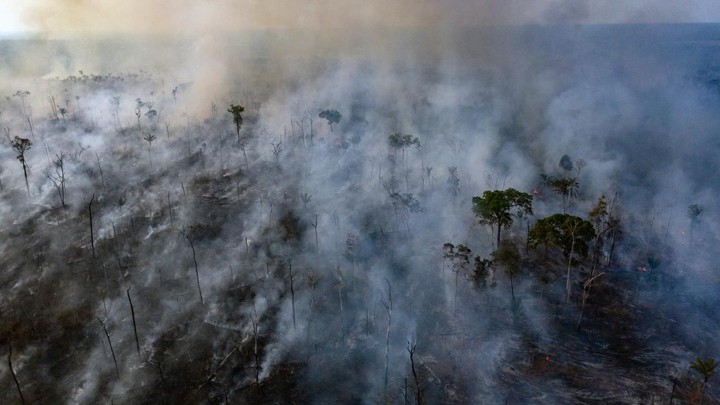
As tongues of flame lapped the planet’s largest tract of rainforest over the past few weeks, it has rightfully inspired the world’s horror. The entire Amazon could be nearing the edge of a desiccating feedback loop, one that could end in catastrophic collapse. This collapse would threaten millions of species, from every branch of the tree of life, each of them—their idiosyncratic splendor, their subjective animal perception of the world—irretrievable once it’s gone. This arson has been tacitly encouraged by a Brazilian administration that is determined to develop the rainforest, over the objections of its indigenous inhabitants and the world at large. Losing the Amazon, beyond representing a planetary historic tragedy beyond measure, would also make meeting the ambitious climate goals of the Paris Agreement all but impossible. World leaders need to marshal all their political and diplomatic might to save it.
The Amazon is a vast ineffable, vital, living wonder. It does not, however, supply the planet with 20 percent of its oxygen.
As the biochemist Nick Lane wrote in his 2003 book Oxygen, “Even the most foolhardy destruction of world forests could hardly dint our oxygen supply, though in other respects such short-sighted idiocy is an unspeakable tragedy.”
The Amazon produces about 6 percent of the oxygen currently being made by photosynthetic organisms alive on the planet today. But surprisingly, this is not where most of our oxygen comes from. In fact, from a broader Earth system perspective, in which the biosphere not only creates but also consumes free oxygen, the Amazon’s contribution to our planet’s unusual abundance of the stuff is more or less zero. This is not a pedantic detail. Geology provides a strange picture of how the world works that helps illuminate just how bizarre and unprecedented the ongoing human experiment on the planet really is. Contrary to almost every popular account, Earth maintains an unusual surfeit of free oxygen—an incredibly reactive gas that does not want to be in the atmosphere—largely due not to living, breathing trees, but to the existence, underground, of fossil fuels.
Shanan Peters, a geologist at the University of Wisconsin at Madison, is working to understand just how it was that our lucky planet ended up with this strange surplus of oxygen. At a presentation in June, at the North American Paleontological Convention in Riverside, California, he pulled up a somewhat unusual slide.